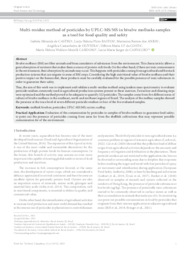Multi-residue method of pesticides by UPLC-MS/MS in bivalve mollusks samples as a tool for food quality and safety.
Multi-residue method of pesticides by UPLC-MS/MS in bivalve mollusks samples as a tool for food quality and safety.
Author(s): CASTRO, I. M. de; BASTOS, L. H. P.; ANJOS, M. R. dos; OLIVEIRA, A. C. DE; COSTA, D. M. S. F. DA; CARDOSO, M. H. W. M.; CARVALHO, L. M. J. DE
Summary: Bivalve molluscs (BM) are filter animals and bioaccumulators of substances from the environment. This characteristic allows a great absorption of nutrients that makes them a source of protein-rich foods. On the other hand, if there are toxic contaminants in the environment, their absorption by animals may occur. This happens with pesticides coming from agricultural and livestock production systems that can migrate to areas of BM crops. Considering the high nutritional value of bivalve molluscs and their positive impact on the human diet, these products must be carefully evaluated for the possible presence of toxic substances in order to guarantee their safety. Thus, the aim of this work was to implement and validate a multi-residue method using tandem mass spectrometry to evaluate pesticide residues commonly used in agricultural production systems present in these matrices. Extraction and cleaning steps were optimized and the method proved to be adequate to quantify 322 pesticides. The samples come from five different areas of culture of bivalve molluscs in the southeast, north and northeast regions of Brazil. The analysis of the mollusc samples showed the presence at the trace level of seven different pesticide residues in four of the five evaluated samples.
Publication year: 2023
Types of publication: Journal article
Unit: Embrapa Food Technology
Keywords: Mollusk bivalves, Oyster, Pesticides, Scallop, UPLC MS MS
Observation
Some of Embrapa's publications are published as ePub files. To read them, use or download one of the following free software options to your computer or mobile device. Android: Google Play Books; IOS: iBooks; Windows and Linux: Calibre.
Access other publications
Access the Agricultural Research Database (BDPA) to consult Embrapa's full library collection and records.
Visit Embrapa Bookstore to purchase books and other publications sold by Embrapa.

